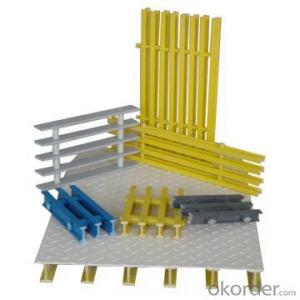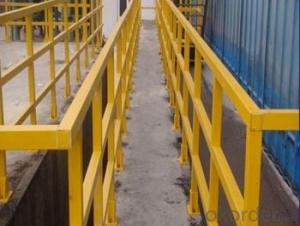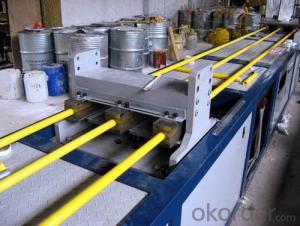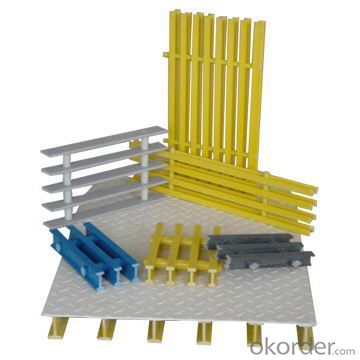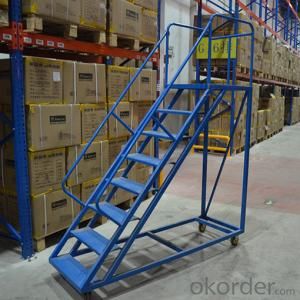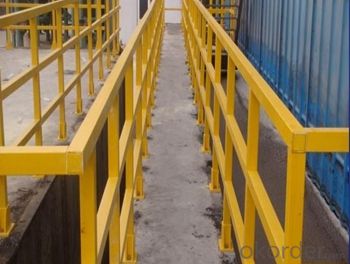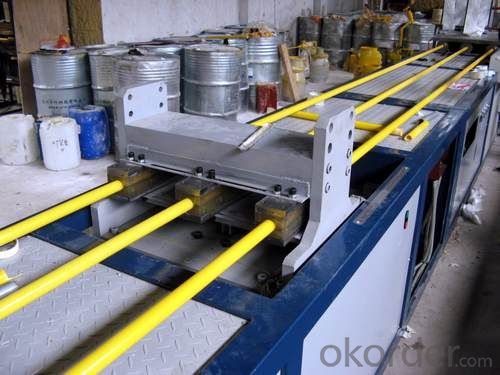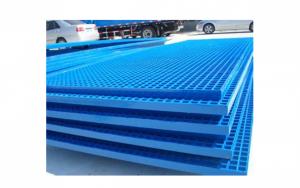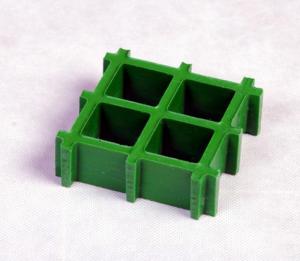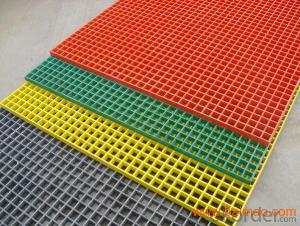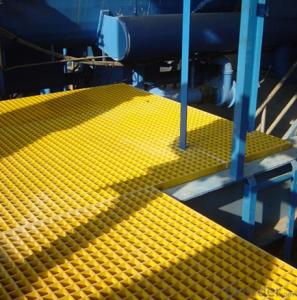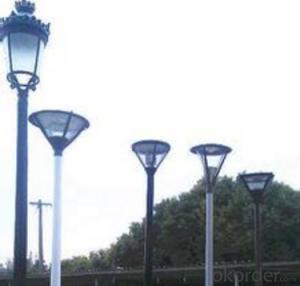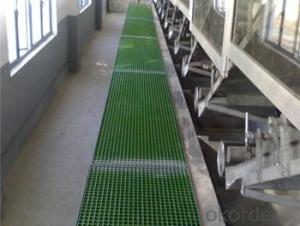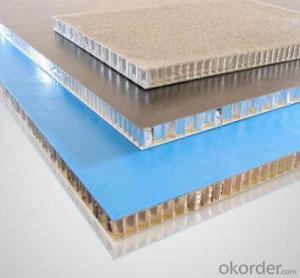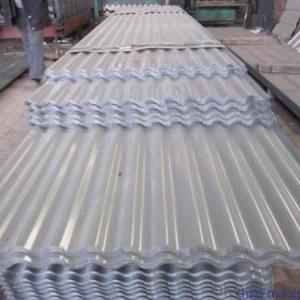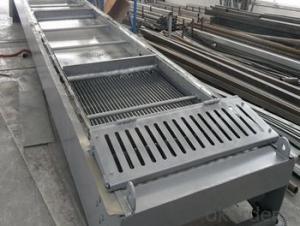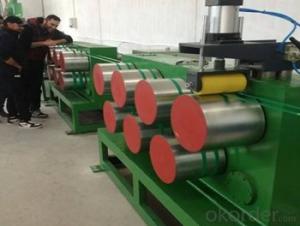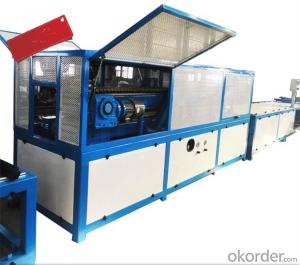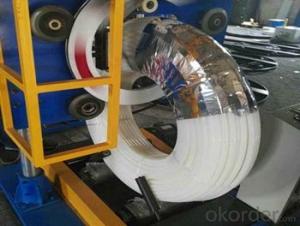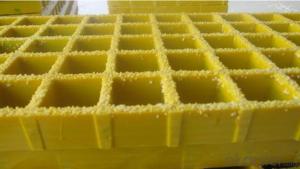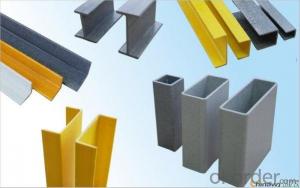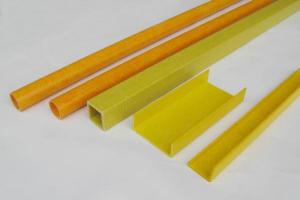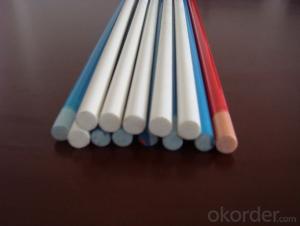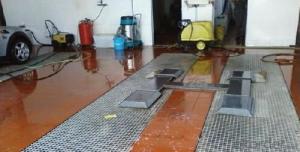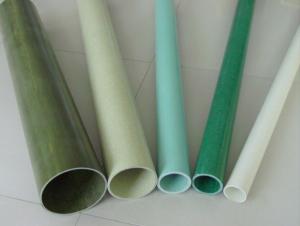FRP Pultrusion Profiles with Excellent Electromagnetism Property FRP Pultruded Gratings
- Loading Port:
- Tianjin
- Payment Terms:
- TT OR LC
- Min Order Qty:
- 4000 m.t.
- Supply Capability:
- 430000 m.t./month
OKorder Service Pledge
OKorder Financial Service
You Might Also Like
Specification
PRODUCT DESCRIPTION
Pultruded grating is made by a particular assembly process, which using “I” shape as its main load-bearing and special rod to go through the bearing bar. Pultruded grating include the standard grating and the custom grating, the custom grating can be designed to meet customer’s requirement or special using condition by changing the shape, size and space of the bearing bars, the surface can be covered with lozenge panel, grit panel, or added the anti-slippery sand directly.
FRP pultruded grating has the most characteristics of molded grating, but it has its distinct advantages, it has very high fiberglass content in the loading direction, so it has very high load capability, it has more superiority when used at wide span, so that the basic support will be decreased and the project cost will be reduced accordingly.
SPECIFICATION
The standard space between two crossbars is 6 inch or 12 inch.
Thickness (mm) | Bar width (mm) | Open space (mm) | Open rate (%) | Approx weight (kg/m |
25.4 | 15.2 | 22.8 | 60 | 13.2 |
25.4 | 15.2 | 15.2 | 50 | 15.9 |
25.4 | 15.2 | 10.1 | 40 | 18.5 |
25.4 | 40 | 10.8 | 21 | 14.5 |
38.1 | 15.2 | 22.8 | 60 | 15.8 |
38.1 | 15.2 | 15.2 | 50 | 19.1 |
38.1 | 15.2 | 10.1 | 40 | 22.4 |
50.8 | 25.4 | 25.4 | 50 | 16.6 |
50.8 | 25.4 | 12.7 | 33 | 21.1 |
FEATURES
a. Anti-corrosion and anti-rust
b. Light weight and high strength
c. Anti-flammable
d. Anti- fatigue
e. Safe and anti-slippery
f. Anti-ageing
g. Easy of maintenance
h. Excellent electromagnetism property
i. Good economic benefit
FIELDS SERVED
Sewage treatment,
water supply and drainage,
chemical industry,
oil industry,
power engineering,
pulp and paper,
construction engineering,
spinning, marine engineering.
APPLICATION
Operation terrace,
stair walkway,
ground floor,
trench cover,
sidewalk,
foot bridge,
equipment safety fence,
scaffold.
COMPANT DESCRIPTION
CNBM,China National Building Materials Group is a state-owned enterprise in charge of administrative affairs in china building materials industry. Established in 1984, CNBM is a large group corporation of building materials with total assets of 25 billion RMB and a total staff of 30,000.CNBM now owns 200 subordinating firms of solely owned and joint-venture companies.
CNBM International Corporation is one subsidiary of CNBM, we focus on offering good-quality products,professional service and complete solution to our customers. Strong delivery capacity, advanced technology& management, strong financing capability and excellent after-sale service are our advantages in sharing international market.
PACKAGING & DELIVERY
1.Packaging Details:
standard packing or your requirement
2.Delivery Detail:
Shipped in 30 days after payment
FAQ
1.Q:Are you factory or trading company ?
A:We are Factory produce FRP machines and FRP products.
2.Q:If can customized by customers requirements?
A:yes,we can produce the machine with customized size.
3.Q:How about the payment?
A:We accept any kind of payment.
4.Q:What is the guarantee?
A:Gurantee is one year.
5.Q:If you can training?
A:yes ,we can training in our factory also can send engineers to your factory training.
PICTURES
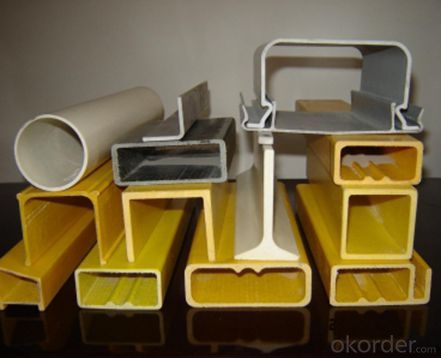
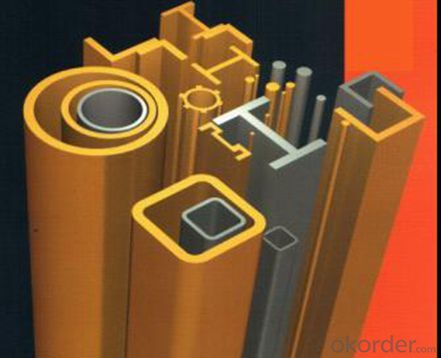
- Q: Can FRP pultrusion profiles be used in the construction of stadium seating?
- Yes, FRP pultrusion profiles can be used in the construction of stadium seating. FRP (Fiber Reinforced Polymer) pultrusion profiles offer high strength, durability, and corrosion resistance, making them a suitable choice for stadium seating applications. These profiles can be customized to meet specific design requirements and provide a lightweight alternative to traditional materials like steel or concrete.
- Q: How do FRP pultrusion profiles perform in earthquake-prone areas?
- When it comes to performance in earthquake-prone areas, FRP (Fiber Reinforced Polymer) pultrusion profiles have numerous advantages. To start with, their high strength-to-weight ratio is well-known. This means that they are lightweight compared to traditional construction materials like steel or concrete, yet still offer significant strength. This characteristic is crucial in earthquake-prone areas as it reduces the overall mass of the structure, minimizing the inertial forces generated during seismic events. As a result, FRP profiles can effectively withstand and absorb the energy released during an earthquake, reducing the risk of structural damage or collapse. Additionally, FRP pultrusion profiles exhibit excellent durability and resistance to corrosion. Unlike steel, they are not susceptible to rust or other forms of degradation caused by moisture or chemicals commonly found in earthquake-prone areas. This resistance to corrosion ensures the long-term performance and reliability of FRP profiles, minimizing the need for costly maintenance and repairs. Furthermore, FRP pultrusion profiles demonstrate high flexibility and ductility. These characteristics allow them to deform and absorb energy without fracturing or breaking, which is particularly advantageous during seismic events. By dissipating the energy generated by the earthquake, FRP profiles help protect the integrity of the structure and prevent catastrophic failures. Lastly, FRP pultrusion profiles are non-conductive materials, meaning they do not conduct electricity. This feature is important in earthquake-prone areas where electrical infrastructure can be vulnerable to damage. The non-conductive nature of FRP profiles reduces the risk of electrical faults or fires caused by seismic activity. In conclusion, FRP pultrusion profiles provide a range of performance advantages in earthquake-prone areas. Their lightweight, high strength, durability, flexibility, and non-conductive properties make them a reliable and effective choice for construction in regions prone to seismic activity.
- Q: What are the different shapes and sizes of FRP pultrusion profiles available?
- There is a wide selection of FRP pultrusion profiles, which come in various shapes and sizes, to accommodate different applications and industries. Some of the commonly found shapes are as follows: 1. Square and rectangular profiles: These profiles are utilized in construction, infrastructure, and industrial sectors, and they come in different dimensions. They possess exceptional structural strength and can serve as beams, columns, or other load-bearing components. 2. Round profiles: Round FRP pultrusion profiles are frequently employed as structural supports, handrails, and guardrails. They are available in different diameters to suit specific requirements. 3. I-beams: FRP I-beams are well-liked in the construction field because of their high strength-to-weight ratio. They are commonly used as structural members, supporting elements, or floor joists. 4. Channel profiles: Channel-shaped FRP profiles are utilized in applications that demand a combination of strength and versatility. They find use in cable trays, equipment supports, and framing systems. 5. Angle profiles: FRP angle profiles are commonly used as reinforcements or supports in construction and industrial settings. They provide stability and structural integrity to various components. 6. Custom profiles: In addition to the standard shapes mentioned above, FRP pultrusion profiles can be tailor-made to meet specific requirements. Manufacturers have the capability to create profiles with unique shapes and sizes that cater to the needs of different applications. It is worth noting that the availability of shapes and sizes may differ among manufacturers. Therefore, it is advisable to consult suppliers or manufacturers to determine the specific range of FRP pultrusion profiles they offer.
- Q: The manufacturing process of FRP products?
- Each technique has its own characteristics. Production enterprises determine the process method in the selection, according to the basic situation of the enterprise and the production of products, such as mass production and product quality requirements, as well as the technical basis for enterprise capital and production factors such as comprehensive consideration.
- Q: Are FRP pultrusion profiles resistant to mold and mildew?
- Yes, FRP pultrusion profiles are highly resistant to mold and mildew. The non-porous nature of the fiberglass reinforcement and the synthetic resin matrix used in pultrusion manufacturing make these profiles highly resistant to moisture absorption, preventing the growth of mold and mildew.
- Q: Are FRP pultrusion profiles resistant to chemicals used in food packaging?
- Yes, FRP pultrusion profiles are generally resistant to the chemicals commonly used in food packaging. The combination of fiberglass reinforcement and resin matrix used in FRP profiles provides excellent chemical resistance, making them a suitable choice for applications involving contact with food packaging chemicals. However, it is always recommended to consult with the manufacturer or supplier to ensure specific compatibility with the chemicals involved.
- Q: Can FRP pultrusion profiles be used in architectural or decorative applications?
- Certainly, architectural or decorative applications can definitely make use of FRP pultrusion profiles. FRP, an acronym for Fiber Reinforced Polymer, is a composite material that combines sturdy fibers like glass or carbon with a polymer resin matrix. This combination results in a material that is lightweight, durable, and resistant to corrosion, making it ideal for a variety of purposes, including architecture and decoration. The versatility of FRP pultrusion profiles lies in their ability to be manufactured in various shapes and sizes, making them highly adaptable for architectural and decorative uses. These profiles can be utilized to construct visually appealing structures such as columns, beams, and facades, all of which enhance the aesthetic appeal of buildings. Furthermore, FRP pultrusion profiles can be fabricated to imitate the appearance of other materials, such as wood or metal, enabling the creation of decorative elements that seamlessly blend into the overall design. Moreover, FRP pultrusion profiles offer several advantages over traditional materials commonly employed in architecture and decoration. They are lightweight, making them easier to handle and install, reducing labor costs. Additionally, they exhibit high resistance to corrosion, weathering, and UV radiation, ensuring long-lasting performance in outdoor applications. Furthermore, FRP profiles can be customized to meet specific design requirements, including color, texture, and surface finish, offering endless possibilities for creative expression. In summary, FRP pultrusion profiles are a viable choice for architectural and decorative applications. Their lightweight, durable, and customizable nature makes them suitable for a wide range of design needs, while their corrosion resistance guarantees longevity and low maintenance. Whether it is for structural support or decorative embellishments, FRP pultrusion profiles are an excellent option for enhancing the aesthetics and functionality of architectural and decorative projects.
- Q: Can FRP pultrusion profiles be used in automotive applications?
- Yes, FRP (Fiber Reinforced Polymer) pultrusion profiles can be used in automotive applications. FRP pultrusion profiles offer several advantages that make them suitable for automotive use. Firstly, FRP pultrusion profiles are lightweight yet strong, which is crucial in the automotive industry where reducing weight is a priority for improving fuel efficiency and performance. The high strength-to-weight ratio of FRP profiles allows for the design of lighter and more fuel-efficient vehicles. Secondly, FRP pultrusion profiles possess excellent corrosion resistance, which is important for automotive applications where exposure to various chemicals, moisture, and harsh environments is common. This resistance to corrosion ensures the long-term durability and reliability of the profiles, reducing maintenance costs and increasing the lifespan of automotive components. Additionally, FRP pultrusion profiles offer design flexibility, enabling the creation of complex shapes and geometries that can be customized to meet specific automotive requirements. This flexibility allows for the integration of FRP profiles in various automotive components, such as body panels, structural supports, interior trims, and suspension parts. Furthermore, FRP pultrusion profiles exhibit high fatigue resistance, which is crucial for automotive applications that involve repetitive loading and vibrations. The fatigue resistance of FRP profiles ensures their long-term performance and helps prevent failures and breakdowns. Lastly, FRP pultrusion profiles are electrically non-conductive, which is beneficial for automotive applications where electrical isolation is required. This property eliminates the need for additional insulation and reduces the risk of electrical failures and short circuits. Overall, the combination of lightweight, high strength, corrosion resistance, design flexibility, fatigue resistance, and electrical non-conductivity makes FRP pultrusion profiles suitable for various automotive applications, contributing to improved performance, fuel efficiency, durability, and safety in the automotive industry.
- Q: What are the main uses of pultruded glass fiber reinforced plastic extrusions?
- Construction of shopping malls, in the construction of shopping malls, pull glass fiber reinforced plastic has entered the traditional data shopping malls, such as: doors and windows, concrete templates, scaffolding, staircase handrails, house stalls, wall panels, tendons, decoration materials. It is worth noting that the materials and decoration materials will have a lot of room for improvement.
- Q: Can FRP pultrusion profiles be used in the construction and building materials industry?
- FRP pultrusion profiles are indeed applicable in the construction and building materials sector. These profiles are created by pulling continuous fibers through a resin bath and then into a heated die, which aids in curing the resin and shaping the profile. One of the primary advantages of FRP pultrusion profiles lies in their exceptional strength-to-weight ratio. Despite being lightweight, they possess incredible durability and strength, making them an optimal choice for construction purposes where weight reduction is desired. Moreover, FRP pultrusion profiles exhibit outstanding resistance to corrosion, which proves particularly advantageous in environments with moisture, chemicals, or harsh weather conditions. This corrosion resistance extends the lifespan of building materials, thereby reducing maintenance and replacement expenses. FRP pultrusion profiles can serve a wide array of construction applications, including structural components like beams, columns, and trusses. They are also frequently utilized as reinforcements in concrete structures, offering added strength and durability. Additionally, these profiles find utility in cladding, decking, handrails, ladders, and other non-structural elements within buildings. Furthermore, FRP pultrusion profiles provide design flexibility as they can easily be customized and manufactured to specific shapes, sizes, and properties. This adaptability renders them suitable for diverse construction projects, ranging from small-scale residential buildings to large-scale industrial complexes. In conclusion, FRP pultrusion profiles are highly appropriate for the construction and building materials industry due to their superior strength-to-weight ratio, corrosion resistance, design flexibility, and versatility.
Send your message to us
FRP Pultrusion Profiles with Excellent Electromagnetism Property FRP Pultruded Gratings
- Loading Port:
- Tianjin
- Payment Terms:
- TT OR LC
- Min Order Qty:
- 4000 m.t.
- Supply Capability:
- 430000 m.t./month
OKorder Service Pledge
OKorder Financial Service
Similar products
Hot products
Hot Searches
Related keywords
